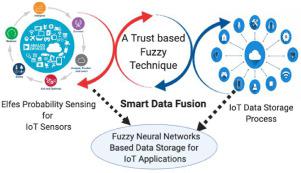当前位置:
X-MOL 学术
›
Comput. Electr. Eng.
›
论文详情
Our official English website, www.x-mol.net, welcomes your
feedback! (Note: you will need to create a separate account there.)
A trust-based fuzzy neural network for smart data fusion in internet of things
Computers & Electrical Engineering ( IF 4.0 ) Pub Date : 2021-01-01 , DOI: 10.1016/j.compeleceng.2020.106901 Sunil Kumar Malchi , Suresh Kallam , Fadi Al-Turjman , Rizwan Patan
Computers & Electrical Engineering ( IF 4.0 ) Pub Date : 2021-01-01 , DOI: 10.1016/j.compeleceng.2020.106901 Sunil Kumar Malchi , Suresh Kallam , Fadi Al-Turjman , Rizwan Patan

|
Abstract Internet of Things (IoT) devices generates a vast amount of data from extensive applications. Maintaining the sensed data with low energy consumption, delay time, and adaptive coverage fraction rate proportionally influences the storage capacity. To maintain a trade-off between above-listed factors, we proposed an Elfes Sugeno Fuzzy and Trust-based Neural Networks (ESF-TNN) approach enables 3-algorithms. First, Elfes Probability Sensing (EPS) Model addresses the coverage fraction of each IoT sensor. Second, Sugeno Fuzzy Processing model regulates the energy consumption by proportionately distributing data to nodes without the defuzzification process. Third, Trust-based Neural Data Storage algorithm enriches an adequate data storage capacity by considering the average classification ratio while processing regenerated data packets to pertain each interaction information via Trust Mechanism. Simulation results show that our proposed method effectively covers the monitored area with 15 Joules of energy consumption and 1-ms delay time along with sufficient storage capacity.
中文翻译:

基于信任的物联网智能数据融合模糊神经网络
摘要 物联网 (IoT) 设备从广泛的应用程序中生成大量数据。以低能耗、延迟时间和自适应覆盖率保持感知数据成比例地影响存储容量。为了保持上述因素之间的权衡,我们提出了 Elfes Sugeno Fuzzy and Trust-based Neural Networks (ESF-TNN) 方法支持 3 算法。首先,Elfes 概率感知 (EPS) 模型解决了每个 IoT 传感器的覆盖率问题。其次,Sugeno Fuzzy Processing 模型通过将数据按比例分配到节点而不进行去模糊化过程来调节能耗。第三,基于信任的神经数据存储算法通过在处理再生数据包时考虑平均分类比来丰富足够的数据存储容量,以通过信任机制来关联每个交互信息。仿真结果表明,我们提出的方法有效地覆盖了监控区域,能耗为 15 焦耳,延迟时间为 1 毫秒,存储容量充足。
更新日期:2021-01-01
中文翻译:

基于信任的物联网智能数据融合模糊神经网络
摘要 物联网 (IoT) 设备从广泛的应用程序中生成大量数据。以低能耗、延迟时间和自适应覆盖率保持感知数据成比例地影响存储容量。为了保持上述因素之间的权衡,我们提出了 Elfes Sugeno Fuzzy and Trust-based Neural Networks (ESF-TNN) 方法支持 3 算法。首先,Elfes 概率感知 (EPS) 模型解决了每个 IoT 传感器的覆盖率问题。其次,Sugeno Fuzzy Processing 模型通过将数据按比例分配到节点而不进行去模糊化过程来调节能耗。第三,基于信任的神经数据存储算法通过在处理再生数据包时考虑平均分类比来丰富足够的数据存储容量,以通过信任机制来关联每个交互信息。仿真结果表明,我们提出的方法有效地覆盖了监控区域,能耗为 15 焦耳,延迟时间为 1 毫秒,存储容量充足。











































 京公网安备 11010802027423号
京公网安备 11010802027423号